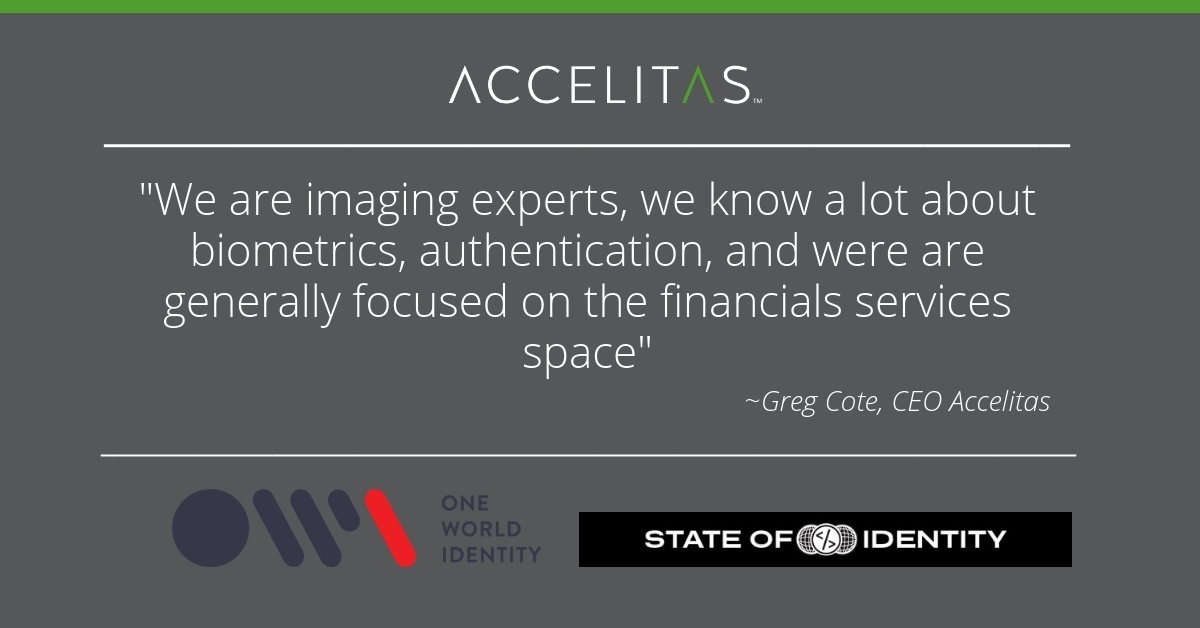
Looking for a crash course on predictive analytics for lending decisions, technology for establishing identity, financial services market trends, different forms of identity theft, and the importance of combining Artificial Intelligence (AI) techniques for delivering the most precise and understandable scores for making lending decisions?
In a wide-ranging 35-minute podcast, Accelitas CEO Greg Coté covers everything you need to know about Identity Intelligence and more with One World Identity’s Cameron D’Ambrosi.
Leveraging Identity Intelligence to identify more creditworthy consumers
Founded in 2016, One World Identity (OWI) is an independent advisory and digital strategy consultancy focused on trust and the data economy.
The podcast, titled “A Golden Needle in a Haystack,” is part of One World Identity’s “State of Identity” podcast series, which focuses on issues and trends related to identity.
In the podcast, Greg and Cameron begin by discussing the role Accelitas plays in the world of identity intelligence. Accelitas has expertise in predictive data analytics, running large AI, machine learning, and deep learning models on data related to the identity and creditworthiness of consumers. Analytics like this are especially important in a tightening credit market.
Greg points out that he’s familiar the challenges of credit markets. He spent 14 years working for two large regional banks where he was responsible for writing credit policies. He knows what it means to have to evaluate risk and to pursue people who have defaulted on credit.
Lending Decisions Used To Be Linear
Lending decisions used to be much more linear. For a long time, they were based on face-to-face interviews at a local bank or credit union.
Today, more applications are occurring online, even on mobile devices, and lenders have to find different data and perform different types of analysis to make a sound decision, while avoiding fraud.
Increasing the urgency of this problem: Millennials and Generation Z prefer online interactions for managing their finances. And these groups, like immigrants, often lack the lengthy credit histories that used to form the basis of scores used for making lending decisions in the past.
As Greg says: “You’ve got automated platforms trying to connect to people in a remote kind of way, and you’re trying to find data on a set of people that maybe don’t play the same way their parents did.”
Cameron points out that some FinTech companies are trying to make lending decisions by collecting thousands of data points for each consumer.
A Different Approach
Accelitas is taking a different approach, working with fewer but more significant data points, and delivering predictive insights that outperform those produced by algorithms requiring thousands of data points.
Greg points out there are three pieces to the identity puzzle:
- Customer Onboarding, where a bank tries to get data about a customer for onboarding
- Identity Access, which can be used for controlling physical access to a building or logical access to a network,
- Predictive Insights, which organizations rely on to make predictions about individuals’ future behavior.
Why Identity Intelligence?
Below is an excerpt from Greg on the podcast...
"We think is the way to solve a lot of this is called Identity Intelligence, which is the intersection of these three groups of pieces of data. How do you use more sophisticated techniques to see more identities from people in segments of the population [that] don’t necessarily behave like other populations do?
Identifying predictive signals [to] predict the first payment default, predict a charge-off, or predict things like churn and profitability, [or from the customer’s point of view, to answer questions like] “Am I going to have high balances or high fees?” in the case of a bank or a credit union, because they have different products that they would offer you.
[We optimize] these things over time, where you have to really deep data analytics skills, so you can retrain models over time, you know when those models are starting to migrate sideways, or drift, as we call that. And so there is really an interesting set of skills that you need at the company that you need to be able to do all three of those things well. . . .
We like to use this chart a lot in the presentations that we give. On the left side you’ve got identity data, that historically has been used for one very simple thing, predicting identity, are you who you say you are, seen as the addresses you lived at, SSN reported for those addresses.
And then [on the right] you’ve got your traditional credit line, or tradeline credit data, outstanding lines of credit , like credit cards, or something else, HELOC, what’s outstanding on those lines, the % utilization, what have your payments been on trade lines as well as say your mortgages and your car loans.
In the past, you’ve used credit data to predict credit outcomes, and those were generally compliant with fair credit reporting, and then you’ve used identity data, to confirm identity.
But in the new environment, where we are trying to get more access, to the financial system for the 100 million consumers that have been underserved and left out.
"There’s this really interesting place in the middle, where you can use identity data to predict credit outcomes, and you can use credit data to predict identity."
And that’s the interesting intersection that we’re all journeying into, where you use these very sophisticated techniques, to find very subtle but very predictive signals, in places that maybe weren’t a linear line between the data and where you thought you were going to end up.
And so that is what I think is the new frontier, a space we are very comfortable in, and are moving forward very rapidly through"
A Multidisciplinary Approach to AI
Next, Greg explains how, by taking a multidisciplinary approach to AI and applying multiple analytical techniques, Accelitas is able to deliver predictive scores that can also be explained and refined. (In the podcast, he refers listeners to our blog post, “The Benefits of Crossing Disciplines in Artificial Intelligence.” Check it out if you’d like to explore an example of using AI to deliver scores that are both predictive and interpretable.)
In a recent data trial, the Accelitas platform, working with just 20 data points, delivered results that were 109% more predictive than the scores offered by another FinTech company, which was analyzing over 1300 data points. The Accelitas service that delivered these superior results was 77% cheaper than that of the competitor.
As Greg says, “The signals are there. The trick is getting really good at the analytics.”
Want to learn more?
Download our eGuide, 'The Invisible Marketplace' and learn 5 ways Artificial Intelligence and alternative data can help lenders secure good customers in a digital world.


